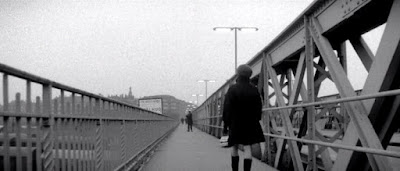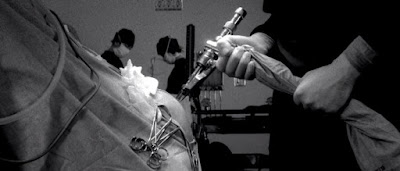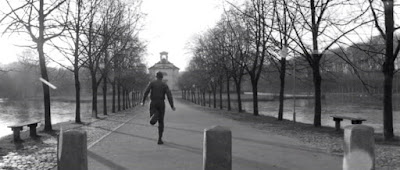... aka: Dr. Holst fantasztikus esete (Dr. Holst's Fantastic Case)
... aka: Mannen som tenkte ting (The Man Who Thought Things Through)
... aka: Man Who Thought Life, The
... aka: Mies joka pohtii elämää (The Man Who Reflects on Life)
Directed by:
Jens Ravn
Renowned brain surgeon and psychiatrist Dr. Max Holst (Preben Neergaard), who works at a state mental hospital and specializes in the central nervous system, receives a phone call from colleague Robert Klausen (Lars Lunøe). An older man was found wandering around a bridge and behaving like a madman so he was picked up by police and then involuntarily committed to the hospital. Robert informs Max that the man - who goes by the name of Steinmetz (John Price) - claims to know him and refuses to talk to anyone else other than him. The name doesn't ring a bell, but he assumes it's a patient from long ago that he's forgotten about. Upon arriving at the hospital, he realizes that's not the case. He has no clue who this man is.
Steinmetz has already broken hospital rules by sneaking in cigars and cognac (both forbidden there) but just how did he possibly sneak that stuff past the hospital staff? He claims that he's been following Max and his work for awhile but refuses to give any further details. And he claims to be perfectly sane and tries to coerce Max into signing his release; promising to show him "a new science" and "a world you could never even have dreamed of" if he helps. Dr. Holst instead decides to keep Steinmetz right where he's at until he can examine this man further.
Soon after, the bizarre patient manages to vanish from his room despite his door being locked and there being bars over the windows. Nothing seems to have been tampered with. The cigars and cognac which were taken away from him earlier are back on the table. A mysterious duplicate key that has to no reason to really exist is found hanging from the lock. A note is left behind for Max. Steinmetz urges him to meet him at a bridge at dusk. And to come alone. Max decides to take him up of the offer and finds Steinmetz waiting for him on the bridge with a chauffeured car.
During the ride, Steinmetz reveals that he knows all about Max, including when he was born, that he's an orphan, that he was part of the Resistance during his youth, that he studied in America and that he's divorced from his first wife, has no children and is now dating young actress Susanne Plesner (Lotte Tarp). Steinmetz takes him to his home, where he finally shows him some of what he was blathering on about in the hospital. Max sees with his own eyes how Steinmetz is able to create a box of cigars simply by concentrating and willing it to happen. In other words he has created a tangible object using only his mind.
However, the rational, stubborn Max is a little difficult to convince. He initially assumes Steinmetz is a hypnotist who has somehow put him in a trance. Steinmetz promises to prove otherwise, but on two conditions: One, he's never to tell anyone else about any of this. Two, he's to perform brain surgery on him. He's even "willed" himself the most high tech operating room imaginable, which is tucked away in his home; hidden behind a secret door in the wall. Max's refusal to cooperate soon has Steinmetz tossing niceties out the window ("You'll do what I tell you to!") but things will get much worse than Max ever could have imagined.
Steinmetz has managed to unlock parts of his brain that the rest of us cannot access. However, his ultimate goal is to be able to use his mind to produce organic matter; life itself. His sights are especially set on creating a human being. He's already managed to create three mice, but each of them has dissolved into thin air after a short while because he can't maintain the level of concentration necessary to keep them. Hence his desire for the surgery. Max remains resistant, prompting Steinmetz to start stalking him and using his powers to mess with both his mind and his memory, which starts to have a detrimental effect on his career, studies and relationships.
Steinmetz's approach to coercion is so abstruse yet so potentially devastating, Max has to no choice but to keep dealing with him on a continual basis. He arranges for him to get a new apartment, which gets Max out of his tiny hospital apartment, gets Susanne away from her nosy, bitchy landlady and finally allows them to live together. However, word keeps getting back to Max about things he's said, things he's done and interactions he's had with various people that he has no memory whatsoever of. As it turns out, Steinmetz is mind-creating a doppelgänger of Max to cause chaos and confusion in his life... and the copy is actually much more agreeable than the real thing! His "better half" if you will.
The double cashes his paychecks, takes his identification and belongings, does his job better, gives more passionate, persuasive speeches, starts wearing suits, puts on a more "respectable" clean-shaven face for the world at large and even has a healthier relationship with his girlfriend! Soon enough, everyone thinks he's the impostor and the double is him, which gets him arrested for "stealing" his own car. Max breaks out in time to crash the wedding reception only to realize that no one, not even his former lover, believes he is who he says he is. They prefer the new and improved Max. Steinmetz also informs him that he no longer needs his assistance as he's managed to sustain the length of his creations long enough to just have the double do the surgery. Max now finds himself without a job, money, a home, friends, a girlfriend... Will there be any way for him to get his life back again?
This was a Palme d'Or nominee at Cannes in 1969 and then fell into obscurity almost immediately afterward. So how in the hell does something this good just get swept under the rug and then forgotten? Doesn't anyone care? If I had to venture a guess I'd say this all boils down to the sci-fi and horror elements both being very understated and the absence of marketing gimmicks. It's simply easier to sell an audience special effects, fantastical creatures and more overt horrors than it is to woo them with technical proficiency and subtle psychological mindfuckery. There's no violence, no monsters, no elaborate visual effects (the only effect is a split screen used so Max and his double can share a single shot) and no overt shocks in this one.
Instead, we get an intriguing story that hooks you right from the start, an understated creepiness and superb direction, production design, lighting and grainy black-and-white photography. The art direction is purposeful, amazingly uncluttered and quite striking in its restraint. The architectural designs are very eye-catching throughout. Parallel lines, various geometric shapes and symmetry are all used creatively within shots to arresting effect. There's tasteful use of zoom shots (often pulling back from mirrors, windows and doorways) and blurred images plus lots of pans, tracking shots and gliding back and forth between people and things. From a visual standpoint, this maintains total interest throughout but it's also very interesting content-wise. There's plenty of food for thought in the strong, thought-provoking script plus excellent acting from the two male leads.
The cast also includes Kristen Rolffes (The Kingdom) and Elith Pio (Häxan). This was based on a 1938 novel of the same name by Valdemar Holst. The English-language title ("The Man Who Thought Life") seems more than a little bit awkward at first but makes perfect sense once you watch the entire film. Translations of the other European release titles give us slightly altered versions of that like "The Man Who Thought Things," "The Man Who Thought Things Through" and "The Man Who Pondered Life." There was a digitally remastered DVD release through Palladium Film.
★★★1/2





































Great review and OUTSTANDING visual representation for this underrated film!
ReplyDeleteThank you!
ReplyDelete